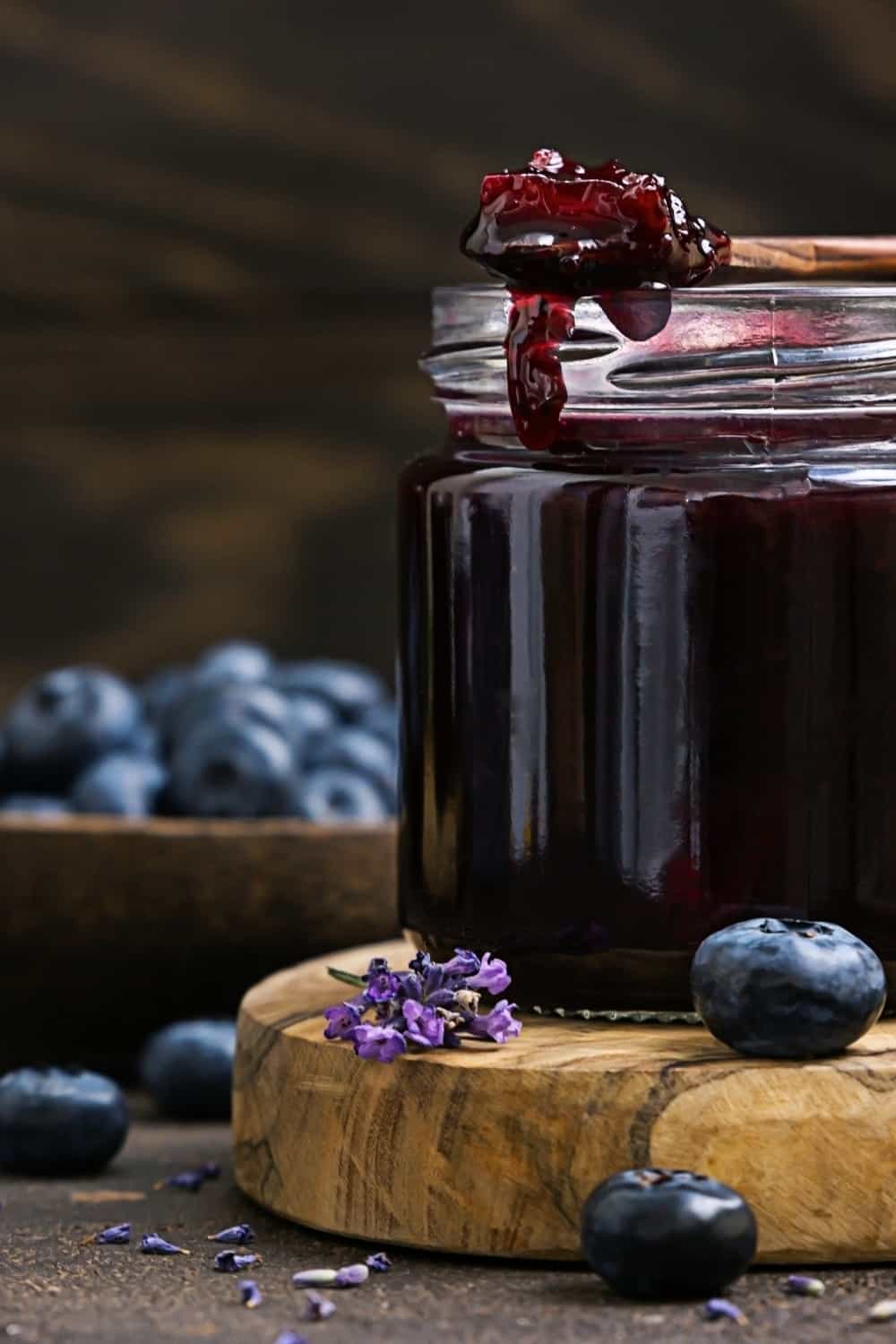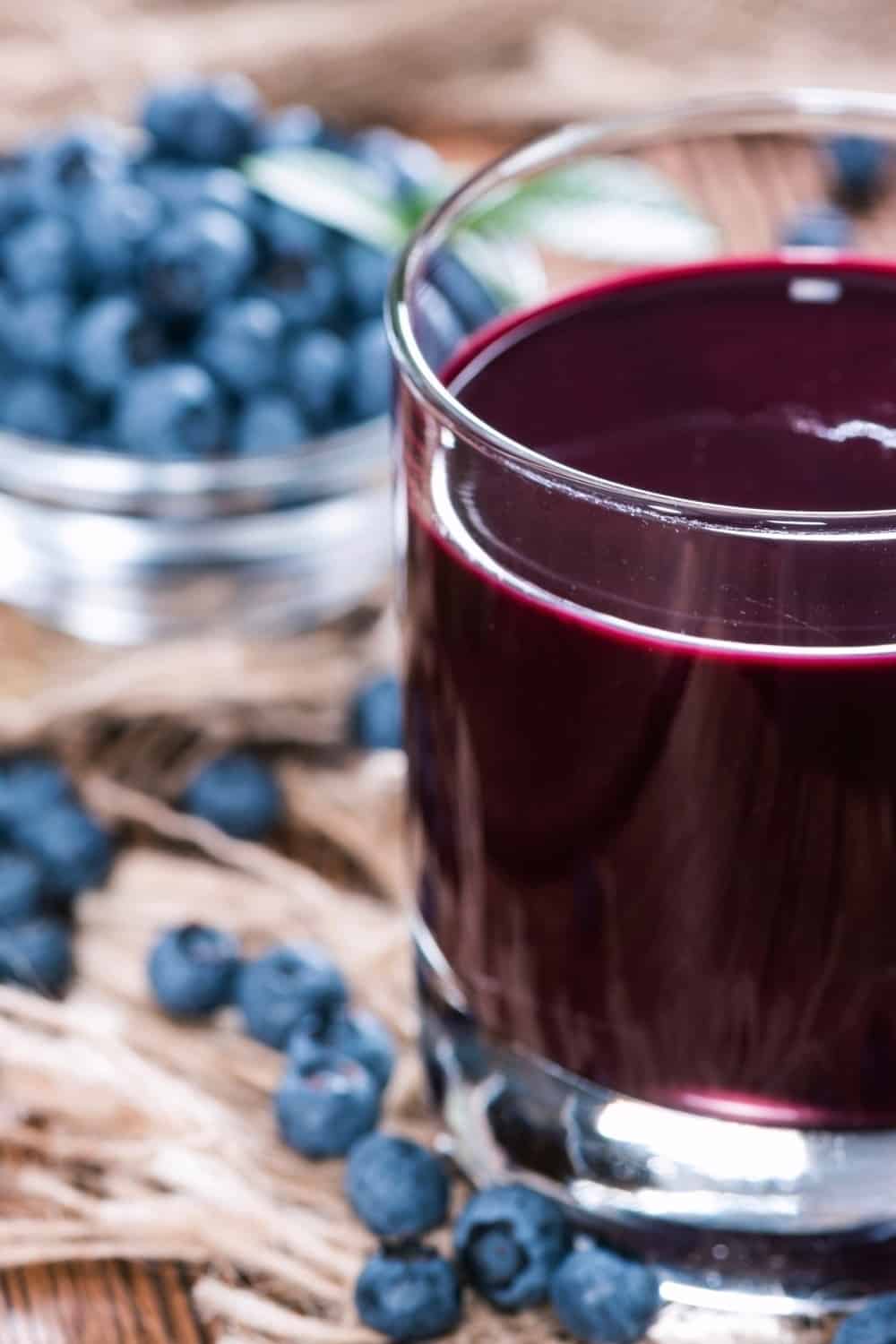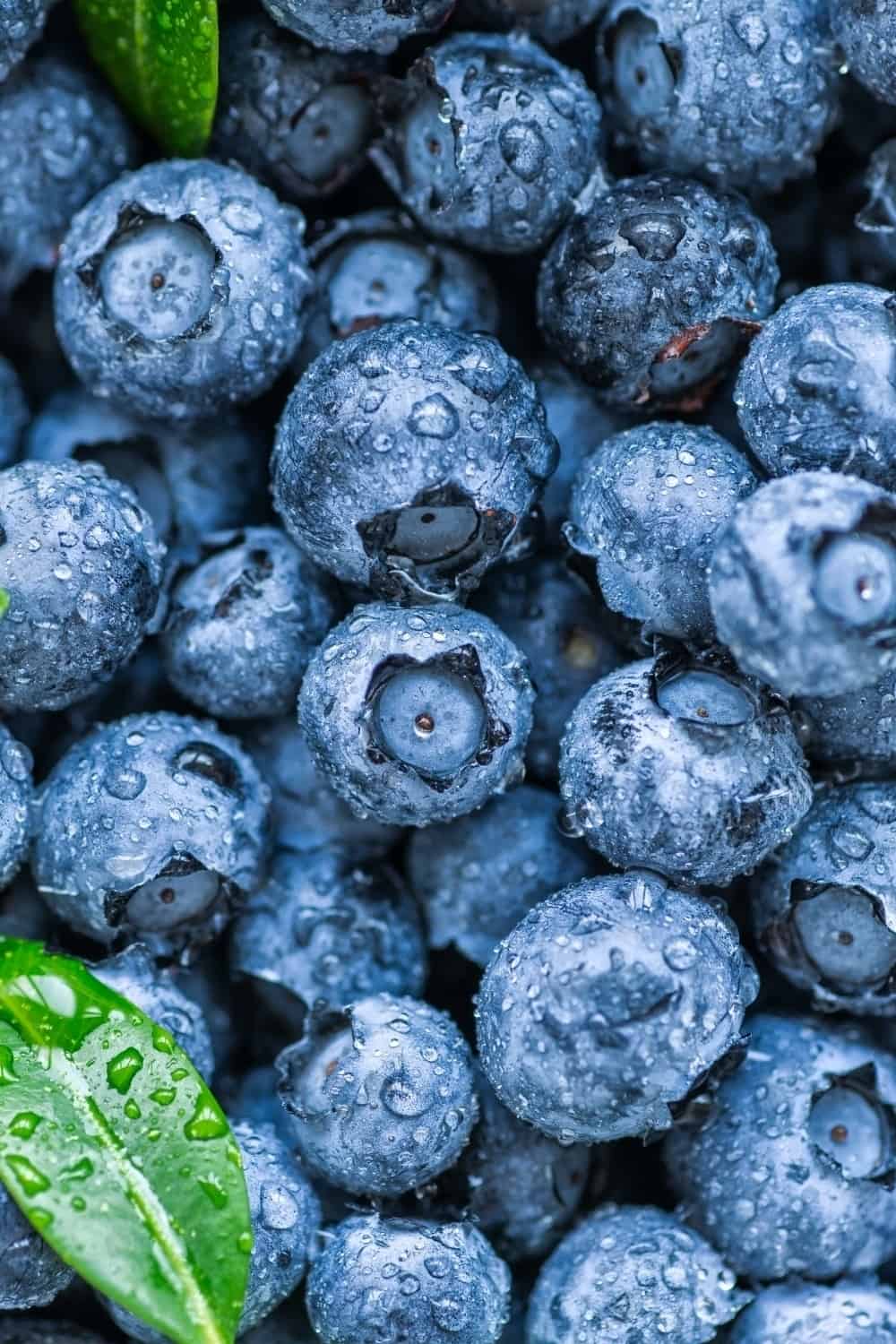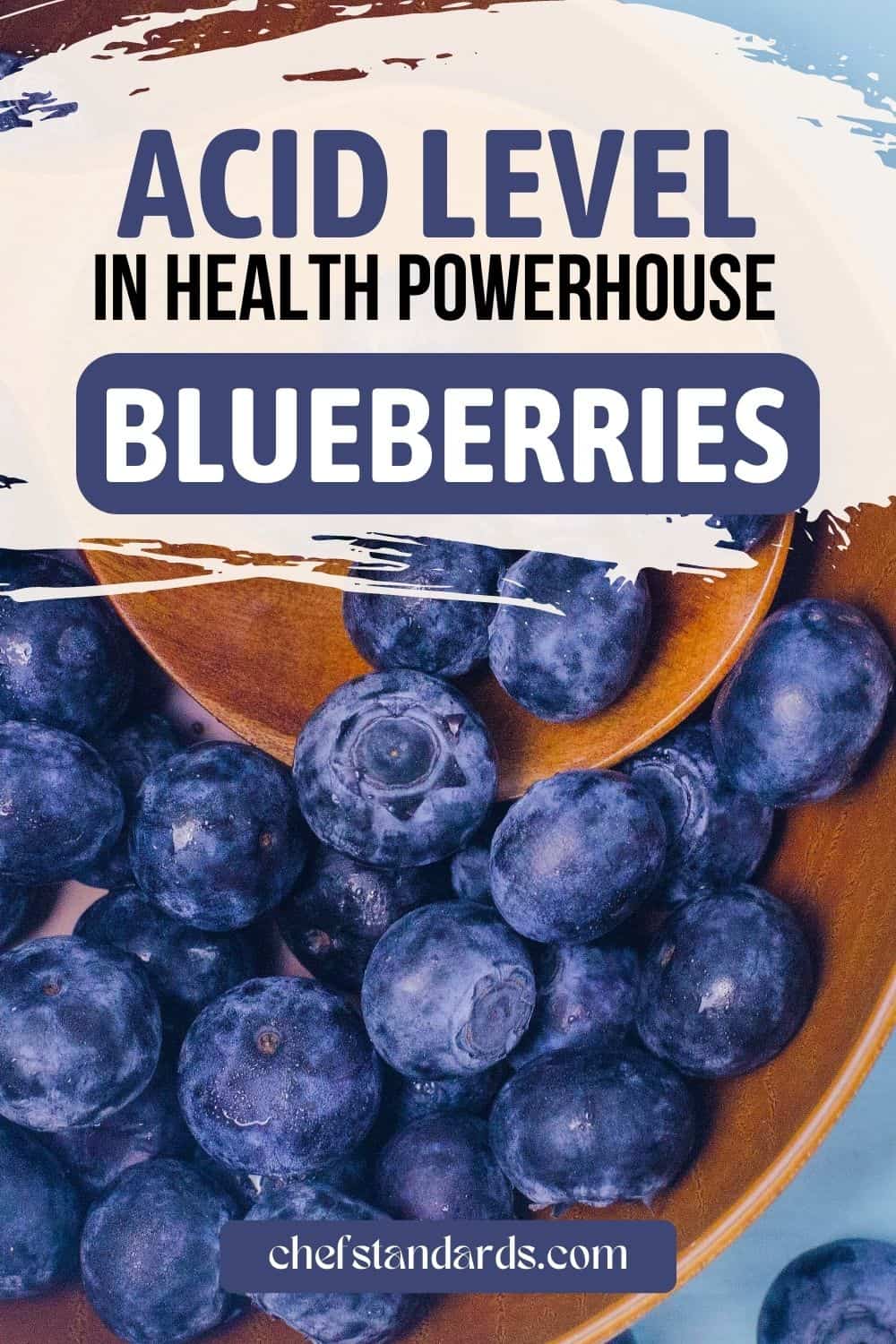Speaking about healthy food, one must mention amazing blueberries. They are berries that grow on perennial flowering plants called blueberry plants and they belong to the genus Vaccinium alongside bilberries, cranberries, huckleberries, and Madeira blueberries.
Blueberries are considered a superfood, and they are becoming more and more popular in recent times considering that eating healthy food is becoming trendy, which is really great for public health.
These berries are full of various types of antioxidants, as well as many essential vitamins and minerals that are extremely beneficial for our overall health.
Just as with almost all other types of berries including mulberries, blackberries, raspberries, cranberries, etc., people tend to think that they are perfect when it comes to health.
But, there is a group of people who have some digestive problems caused by acidic food. And their question is “Are blueberries acidic?”. Unfortunately, blueberries are acidic, but in order for you to find out whether or not you can consume them, I suggest you continue reading.
So, let’s start.
Are Blueberries Acidic Or Alkaline?

So, is blueberry acidic? Yes, blueberries are a type of fruit that is considered acidic fruit. The main reason for that lies in the so-called citric acid, as well as in arginine acid and ascorbic acid to some degree.
Those are the organic compounds and they are part of many types of fruits, including blueberries. Citric acid is most popular for the fact that it gives lemons and limes their recognizable tart, sour taste. You can feel it to some extent when you are eating blueberries as well, as it is present in both flesh and tiny blueberry seeds.
Except that it provides fruits with tartness, citric acid alongside other types of acids boosts the acid level of those fruits. I won’t go deep into the chemistry here, but I will just say that the pH value is inversely proportional to the level of acidity.
The pH value of blueberries is measured on the pH scale and that scale ranges from 0-14. So, if the pH value of food is below 7, that food is acidic. If its value is higher than 7, the food is alkaline. And, if its value is equal to 7, that food is neutral. Water, for example, is neutral.
I already stated that blueberries have a bit higher acid content and that they are considered acidic fruit, so you can conclude that the pH value of blueberries is below 7.
I will show below what the exact pH value of blueberries is.
What Is The pH Level Of Blueberries?

I will start with the pH level of blueberries. The pH level of blueberries ranges from 3.11-3.33. As I already explained, if the pH level of food is below 7, it means that the food is acidic. As you can see, the pH level of blueberries is below that neutral point, so it is obvious that blueberries are acidic too.
But, there are some differences between some types of berries when it comes to pH level, and subsequently acid level. So, let’s take a look.
• pH value of fresh blueberries ranges from 3.12-3.33
• Frozen blueberries are slightly more acidic with a pH value that ranges from 3.11-3.22
• Cooked blueberries are also very acidic and their pH value ranges from 3.1-3.4
• The same goes for dried blueberries since their pH value ranges from 3.11-3.44
• And finally, there are wild blueberries that have the lowest level of acidity since their pH value ranges from 4.0-5.0
So, if a high level of acidity causes you health problems but you really like to consume blueberries, it is best to find wild blueberries because they have the lowest acid level.
Do Blueberries Aggravate Acid Reflux?

Since blueberries are considered acidic fruit, they are not good for people who already suffer from acid reflux and heartburn because they can aggravate acid reflux. Acid reflux is a disease scientifically known as Gastroesophageal reflux disease or GERD.
It happens when the so-called sphincter muscle on the top of your stomach and on the bottom of your esophagus does not work well, i.e. when it relaxes at the wrong time and that way allows stomach acid to enter the tube that connects the throat with the stomach.
That tube is known as the esophagus.
The stomach acid in the esophagus will cause inflammation causing the burning sensation in your chest or heartburn, as well as chest pain, trouble swallowing, and the sensation of a lump in your throat.
So, you don’t want to consume food with a high level of acidity if you have this problem, because more acid will cause more problems in your digestive system due to the more stomach acid production. You have to lower your consumption of acidic food.
However, when it comes to acid reflux and blueberries, if you really like eating blueberries but you have problems with acid reflux, you can still have them. But, I would suggest you consume small quantities of blueberries daily, i.e. not more than half a cup per day.
Half a cup is about 74 grams of blueberries.
Also, make sure that you’re eating wild blueberries because they have the lowest acid level. And, you can also mix them with some low-acid foods to reduce the overall level of acidity.
Some low-acid foods include various fresh and raw veggies, soybeans, miso, tofu, tempeh, amaranth, quinoa, almonds, almond milk, etc.
Is Blueberry Jam Bad For Acid Reflux?

It can not be said that blueberry jam is really bad for acid reflux if you eat it in moderation, but it is not quite good for you either. Blueberry jam has a somewhat similar pH level as raw blueberries, i.e. it ranges from 3.0-3.2.
But that is not the real problem of blueberry jam. The real problem is the fact that producers, when making blueberry jam, tend to mix a good amount of blueberries with a huge amount of sugar, as well as other unhealthy additives.
Additives tend to enhance the level of acidity and, although neutral, sugar tends to make pH more acidic and sugar is not quite good for your stomach and digestive system in general.
In addition, blueberry growers also use pesticides when growing them and those pesticides can be very dangerous for your health.
So, store-bought blueberry jam is not an ideal choice if you suffer from acid reflux or if you are on a low-acid diet.
However, if you are a fan of jams, you can still make homemade blueberry jam in which you’ll add a lower amount of sugar and you won’t add additives either. In that case, you can freely add it to your favorite gluten-free banana pancakes, or any other type of sweet treat.
Does Blueberry Juice Aggravate Acid Reflux?

So, is blueberry juice bad for your acid reflux?
Yes, blueberry juice can definitely worsen the symptoms of acid reflux. Although it has a similar acid level as raw blueberries, blueberry juice is not good for acid reflux at all.
The first obvious reason is the high sugar content in blueberry juice which tends to make the pH level more acidic and it also makes your stomach produce more acid, which is quite bad if you have acid reflux.
The second reason is the fact that blueberry juice does not contain fiber, unlike raw blueberries. Fiber is beneficial for people with acid reflux because it absorbs stomach acids and reduces the consequences of consuming acid from blueberries.
All in all, it is much better to consume whole berries than blueberry juice because whole raw blueberries contain less sugar and, unlike blueberry juices, they are full of fiber that can reduce the consequences of acids from the fruit.
What Are The Benefits Of Eating Blueberries?

Despite the fact that blueberries can be harmful to your digestive system if you have problems with acid reflux or GERD, that doesn’t mean that you shouldn’t consume moderate amounts because they can provide you with numerous health benefits.
Nutritional Value Of Blueberries
This is the nutritional information about 1 cup of blueberries.
• Calories: 84
• Protein: 2 grams
• Fat: Less than 2 grams
• Carbohydrates: 21 grams
• Fiber: 4 grams
• Sugar: 14 grams of sugar
Blueberries are also very high in some essential nutrients including vitamins and minerals, as well as various antioxidants.
• Vitamin A
• Vitamin C
• Vitamin K
• Manganese
• Antioxidants
Blueberries are also a great source of magnesium, potassium, zinc, iron, calcium, and phosphorus, as well as many micronutrients that are very important for our overall health.
Health Benefits Of Blueberries

There are numerous health benefits that blueberries can provide you with and below I will mention the most important ones.
• Maintaining healthy skin: Due to the vitamin C on which collagen relies. Collagen is the key protein when it comes to healthy skin.
• Healthy bones: Phosphorus, iron, magnesium, calcium, manganese, vitamin K, and zinc are the key elements for healthy bones and since blueberries contain each and every one of them, it is no surprise that they are beneficial for your bones.
• Controlling blood pressure: Magnesium, potassium, and calcium are key minerals in reducing blood pressure. Blueberries contain all of these minerals.
• Support for heart health: Blueberries have a large amount of fiber, as well as vitamin C, vitamin B6, potassium, folate, and phytonutrients and those are all good for your heart. Also, the cholesterol level of blueberries is zero and that is great for heart health as well.
• Protects you against cancer: Blueberries are full of powerful antioxidants that can fight free radicals. Free radicals may lead to inflammation that can eventually cause cancer.
• Better mental health: Antioxidants are also great for your mental health and better brain function. Since blueberries are full of them, consuming them can be a great thing if you want to sharpen your brain as well.
• Diabetes management: If you have Type 1 diabetes and you want to achieve low blood glucose levels, I would suggest you consume blueberries since they are high in fiber. Blueberries are also great for people with Type 2 diabetes since it is proven that they improve their blood sugar, insulin, and lipid levels.
• Weight loss: First, blueberries are low in calories and that is primarily why they are good for weight loss. But also, recent studies have found that blueberries contain some compounds that influence the genes for regulation of fat-burning and storage. Also, blueberries help with regulation of blood sugars, which is quite important when it comes to weight loss.
See Also: Are Mangoes Acidic Fruits? What Is Mangoes’ pH Level?
FAQs

Are Blueberries Alkaline?
No, blueberries are not alkaline. Blueberries are acidic fruit since their pH value is below 7. Every type of food whose pH value is below 7 is considered acidic food.
pH value of blueberries typically ranges from 3.11-3.33. which is way below the neutral point on the pH scale.
Are Blueberries Good For Acid Reflux?
No, blueberries are not good for acid reflux since they are acidic fruit and acidic fruit is not recommended for someone who has problems with acid reflux.
However, you can still eat blueberries in moderation if you have acid reflux because a few blueberries won’t do any harm to your stomach.
Just don’t overdo it!
What Fruit Is Low In Acid?
Melons are a type of fruit that is considered low-acid. Those include cantaloupe, honeydew melon, and watermelon and they are least acidic fruits.
Other fruits that are low in acidity and that you can freely consume if you have acid reflux include papaya, avocado, bananas, peaches, figs, and coconuts.
How Much Acid Is In Fresh Blueberries?
Fresh blueberries contain about 2% of acid, i.e. their pH level typically ranges from 3.12-3.33, although wild berries have a pH value that ranges from 4.0-5.0, so they are considered mildly acidic fruits.
If you have problems with acid reflux, it is not recommended to consume a lot of blueberries. However, you can still enjoy them in moderation.
How Many Blueberries Do You Need To Aggravate Acid Reflux?
Since many experts recommend a cup of blueberries a day to healthy individuals, I would recommend you take about half a cup or a little more of blueberries if you have problems with acid reflux.
However, not everyone is the same and not everyone will be affected by this fruit in the same way, so it’s best to consult your doctor to find out the ideal amount of blueberries you can consume.
Bottom Line

It is widely known that blueberries are extremely healthy berries since they are full of beneficial nutrients, as well as all sorts of antioxidants. So, consuming 1 cup of blueberries can be really good for your overall health.
But, what if you have problems with acid reflux? Are there any consequences of consuming blueberries for acid reflux? The main question is “Are blueberries acidic?”. And the answer is positive, blueberries are acidic.
But, fortunately, if you eat fresh wild blueberries in moderation, i.e. half a cup a day, within a healthy and balanced diet, they won’t do any harm to your stomach and you will be able to experience all the fantastic benefits that they can provide you.

